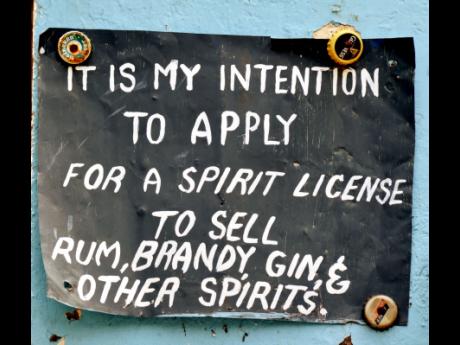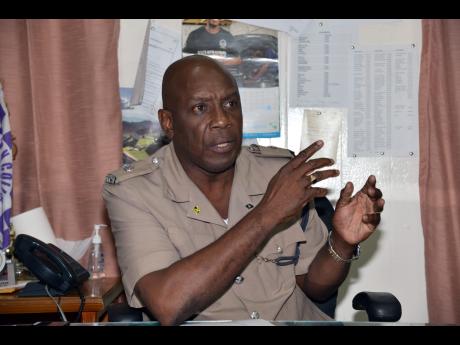Cops crack down on bars - Central Kingston police to go after rum shops operating without licences
"It is my intention to apply for a spirit licence to sell rum, gin, brandy and other distilled spirit at the next court session" is a sign a seen so often at bars, pubs and taverns across the island that many believe it is a necessary part of the decor.
But in most cases, it is a breach of the law by the operators of these establishments, who fail to apply for spirit licences annually in order to legally conduct business.
Head of the Kingston Central Police Division, Superintendent Michael Scott, whose division includes scores of bars displaying this sign, last week warned operators that this does not grant them permission to proceed with the business of selling spirits.
"The problem is that most people do not realise that the intention sign does not permit them to sell alcohol," said Scott.
"The intention sign is for them to tell the public that they intend to open a bar there, so that those persons who want to oppose it can turn up in court or go to the police and give the reasons
why they object. A lot of people are misguided and feel that from they put up the intention sign, they can sell. The only time that you can sell alcohol is if you have a spirit licence," noted Scott.
VIOLATORS WILL BECHARGED
He warned that the police in Central Kingston will be taking steps to prosecute bar operators who do not have the requisite licences.
"I am going to charge them, because most of those intention signs should be replaced by a sign that they are licensed to sell spirits, and a copy of that licence should be on display in the bar," said Scott.
"I had started already, but I am going to be reinforcing it now that The Sunday Gleaner has done its research and is highlighting it."
The failure of the bar operators to apply for the requisite licences is robbing the Government of millions of dollars annually, and one senior member of the Bench has argued that it is the police who are to be blamed.
The judge, whose name is being withheld, charged that police should enforce the law and ensure that bar operators obtain the requisites licences - a spirit licence to sell alcohol and a trade licence to sell items such as soft drinks and peanuts.
"Selling spirits without a licence is an offence, so that is why you have policemen, and that is one of the duties of the sergeant at each station - to ensure he goes around and check," the judge explained.
"In the old days, the police would have a spirit licence book that they would go around and check to see who has a licence," added the judge.
He argued that there is no excuse for the police to not know the persons in possession of licences in the various divisions, as the cops are involved every step of the way.
"In each parish, it is the police who are to make the recommendation whether a licence is to be granted. So if you are not granted a licence or you have not applied for a licence, the police would know. The police should also know how long the bar has been in operation because you can't be in operation indefinitely without a licence. So they ought to know what is happening."
ANNUAL RENEWAL
All spirit licences expire on the March 31 of each year, so an application has to be made before that date.
However, before a spirit licence is granted, the application should be gazetted to allow persons a chance to raise any objection. Once the licence has been granted, that is also to be gazetted to allow the public to be aware that a bar will operate in the area.
"You have three licensing sessions for the year so, therefore, you must have an application in the courts office and then you send a copy to the police superintendent, and they send it out to each station for recommendation," said the judge.
"When it is being done, the police are there in court, so they know who have applied and who have not applied and who have been granted and who have not been granted."
Scott accepted that the police have not necessarily been as vigilant as they should.
"What is supposed to happen is that the police, from time to time, go in and check on licences, so a routine patrolman from off the street can go in and check on a man if he has a licence and make prosecution," said Scott.


